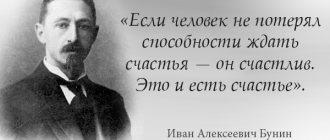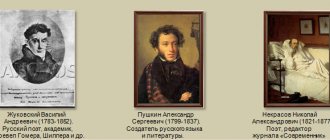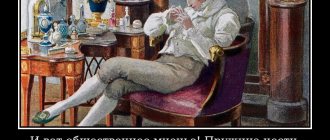Aphorisms and quotes
Orest Adamovich Kiprensky Portrait of A. S. Pushkin.
1827 Canvas, oil. 63 × 54 cm State Tretyakov Gallery, Moscow. Pushkin Alexander Sergeevich (05/25/06/06/1799, Moscow - 01/29/10/02/1837, St. Petersburg) - Great Russian poet, playwright and prose writer, who laid the foundations of the Russian realistic movement, critic and literary theorist, historian, publicist;
one of the most authoritative literary figures of the first third of the 19th century. Even during Pushkin’s lifetime, his reputation as the greatest national Russian poet developed. Pushkin is considered as the founder of the modern Russian literary language. He wrote political epigrams and poems: “Liberty” (1818), “To Chaadaev”, (1818) “Village” (1819), etc. In 1820 he published the poem “Ruslan and Lyudmila”. The freedom-loving sentiments in his work did not go unnoticed by the authorities, and under the guise of official necessity in 1820 he was sent to the south. During his stay in the Caucasus and Crimea, he wrote “Prisoner of the Caucasus” (1822), “Bakhchisarai Fountain” (1824), etc. From 1824 to 1826 he was exiled to his father’s estate Mikhailovskoye. In the fall of 1830, he went to the Nizhny Novgorod estate of his father Boldino, where, due to cholera quarantines, he stayed for 3 months, which became the most fruitful in his work. It was here that he wrote “Belkin’s Tales”, “Little Tragedies”, “The Tale of the Priest and His Worker Balda”, the last chapters of “Eugene Onegin”, as well as about 30 poems. In the autumn of 1833 he returned to Boldino, where he created “The Queen of Spades”, “The Bronze Horseman”, “The Tale of the Fisherman and the Fish”, etc. From November 1833 he lived in St. Petersburg, where he founded the magazine “Sovremennik”. He died of peritonitis as a result of being wounded two days after the duel with J. Dantes. He was buried in the cemetery of the Svyatogorsk Monastery in the Pskov province. The disease of love is incurable!
And the heart burns and loves again - because it cannot help but love. He who has loved once will not love again.
Love for all ages. Love yourself, my honorable reader! The subject is worthy, there is nothing more amiable, it’s true.
The ardor of the heart torments us early, As Chateaubriand said, It is not women who teach us love, But the first dirty romance.
A woman's love does not last long. The cold separation saddens her: Love will pass, boredom will set in, The beauty will love again.
First love is always a matter of sensitivity. The second is a matter of sensuality.
All life is one or two nights.
A vain gift, a random gift, Life, why were you given to me?
If life deceives you, don't be sad, don't be angry! On the day of despondency, reconcile yourself: Believe, the day of joy will come.
The dependence of family life makes a person more moral.
You understand the purpose of life, happy person, You live for life.
I want to live so that I can think and suffer.
And happiness was so possible, So close!
They say that happiness is a good school. May be. But happiness is the best university. It completes the education of a soul capable of good and beautiful things.
There is no happiness in the world, but there is peace and will.
In general, the unhappiness of family life is a distinctive feature in the morals of the Russian people. I love Russian songs: their usual content is either the complaints of a beautiful woman who was forced into marriage, or the reproaches of a young husband to a hateful wife.
The less we love a woman, the easier it is for her to like us.
If a sad woman, through tears, stealthily, somehow, in spite of habit and reason, forgets to look in the mirror, then she is seriously sad.
You cannot rely on female fidelity; Happy is he who looks at it indifferently.
What happened will not happen again.
Whatever happens will be nice.
Marriage emasculates the soul.
Our wedding songs are sad, like a funeral howl.
You cannot harness a horse and a trembling doe to one cart.
Yes, yes, because attacks of jealousy are a disease just like a plague, like a black spleen, like a fever, like damage to the mind.
It is not only possible, but also necessary to be proud of the glory of your ancestors; not to respect it is shameful cowardice.
We are proud not of the glory of our ancestors, but of the rank of some uncle or the balls of a cousin. Please note that disrespect for ancestors is the first sign of savagery and immorality.
I am far from admiring everything that I see around me... But, I swear on my honor that for nothing in the world I would not want to change my fatherland or have a different history than the history of our ancestors, the way God gave it.
Blessed is he who was young from his youth, Blessed is he who matured in time.
Hello, young, unfamiliar tribe!
Youth is the greatest magician.
But it’s sad to think that youth was given to us in vain.
Poetry is a kind, smart old lady whom you can sometimes go to in order to forget for a moment gossip, newspapers and the troubles of life, to have fun with her sweet chatter and fairy tales; but falling in love with her is reckless.
Poetry, God forgive me, must be stupid.
Poetry is higher than morality - or at least a completely different matter.
I write for myself, but I print for money.
We have literature, but there is no criticism yet. Our journalists scold the name “romantic”, like old women scold the rake as Freemasons and Voltairians - having no idea either about Voltaire or Freemasonry.
There was a time when literature was a noble, aristocratic field. Nowadays it's a lousy market.
Burn the hearts of people with the verb.
Russian writers should not be judged as foreigners. There they write for money, but here (except for me) it’s out of vanity.
One-sidedness in a writer proves a one-sided mind, although perhaps a profound one.
We all learned a little Something and somehow! With such upbringing, thank God, it’s no wonder for us to shine.
A scientist without talent is like that poor mullah who cut up and ate the Koran, thinking to be filled with the spirit of Mohammed.
It will always be as it was; This is how the white light has been since ancient times: There are many scientists - few smart ones, There are darkness of acquaintances - but no friend!
The stomach of an enlightened person has the best qualities of a good heart: sensitivity and gratitude.
Reading is the best teaching!
Following the thoughts of a great man is the most interesting science.
Translators are the post horses of enlightenment.
Ah, it’s not difficult to deceive me!.. I myself am glad to be deceived.
Everyone fusses, lies for two, and everywhere there is a mercantile spirit.
It is possible not to lie; to be sincere is a physical impossibility. The pen will sometimes stop, as if running before an abyss - at something that an outsider would read indifferently.
A slanderer without talent, He searches for sticks with his instincts, And for his daily food - With monthly lies.
The newest lies are the same as the old ones...
Karamzin freed the language from the alien yoke and returned it to freedom, turning it to the living sources of the people's word.
I don’t like to see traces of European affectation and French sophistication in our primitive language. Rudeness and simplicity suited him better.
And what a luxury, what a meaning, what a point in every saying of ours! What gold!
Moral sayings can be surprisingly useful in cases where we can invent little on our own to justify ourselves.
Slander, even without evidence, leaves almost eternal traces.
Envy is the sister of competition, and therefore comes from a good family.
Conceited fool, don’t forget that fame is gained through hard work.
What's glory? Bright patch.
Subtlety does not prove intelligence. Stupid people and even crazy people can be surprisingly subtle.
Precision is the politeness of the cooks.
Precision and brevity are the first advantages of prose. It requires thought and thought, without which brilliant expressions serve nothing.
Conscience is a clawed beast that scratches the heart.
Yes, the one whose conscience is not clear is pitiful.
A habit has been given to us from above: It is a substitute for happiness.
Flatterers, flatterers! Try to maintain the posture of nobility even in meanness.
Russia entered Europe like a deflated ship, with the sound of an ax and the thunder of cannons.
No no! It has passed, the destructive time, When Russia bore the burden of ignorance.
... I’m sorry that a gang of traders Lies in flat epigrams Our holy antiquity.
Or is it new for us to argue with Europe? Or is the Russian unaccustomed to victories? Are there not enough of us?..
They (the temporary workers) did not know the limits of their greed, and the most distant relatives of the temporary worker greedily took advantage of his short reign. From here came these huge estates of completely unknown families and a complete lack of honor and honesty in the upper class of the people. From the chancellor to the last protocol officer, everyone stole and everyone was corrupt.
I understand the vicissitudes of times, I will not contradict her, really: We have a new birth of nobility, And the newer, the more noble.
The ranks became the passion of the Russian people.
Take a look at the Russian peasant: is there even a shadow of slavish humiliation in his behavior and speech? There is nothing to say about his courage and intelligence. Its variability is known. The agility and dexterity are amazing.
God forbid we see a Russian rebellion, senseless and merciless.
May the descendants of the Orthodox of their native land know the past fate.
The senseless people are accustomed to running humbly after novelty...
People are never satisfied with the present and, from experience, having little hope for the future, decorate the irrevocable past with all the colors of their imagination.
Two capitals cannot equally flourish in one state, just as two hearts cannot exist in the human body.
Religion is alien to our thoughts and our habits...
Vulgarity is something that has become common among the people.
We honor everyone with zeros, and ourselves with ones.
The more cold, calculating, and circumspect we are, the less we are attacked by ridicule. Selfishness may be disgusting, but it is not ridiculous, for it is reasonable. However, there are people who love themselves with such tenderness, are surprised at their genius with such delight, think about their well-being with such tenderness, about their displeasures with such compassion, that in them selfishness has a funny side of enthusiasm and sensitivity.
Why should we bite the breasts of our nurse; because teething?
You can be a smart person and think about the beauty of your nails.
In any case, there will be a lot of pretty people in hell, where you can play charades.
Everyone in the world has enemies, But save us from friends, God!
Spies are like the letter ъ. They are needed only in some cases, but even here you can do without them, but they are used to poking around everywhere.
And fatal passions are everywhere, And there is no protection from fate.
Lack of public opinion is indifference to all duty, justice, right and truth. This is a cynical contempt for thought and for the dignity of man.
Figure out who is right and who is wrong, and punish both.
Boredom is one of the attributes of a thinking being.
Custom is a despot among people.
One of the reasons for the greed with which we read the notes of great people is our pride: we are glad if we are similar to a wonderful person in any way: opinions, feelings, habits - even weaknesses and vices. We would probably find more similarities with the opinions, habits and weaknesses of completely insignificant people if they left us their works.
I have lived through my desires.
A repeated sharp word becomes stupidity.
The feeling of recovery is one of the sweetest.
Praise and slander were accepted with indifference and do not challenge the fool.
4.5 / 5 ( 26 votes)
The evolution of the theme of freedom in Pushkin's lyrics
Pushkin's lyrics are deep and multifaceted. However, the theme of freedom occupies a special place in it.
The poet never ceased to feel that freedom represents the highest moral value and meaning.
He expressed his understanding of this topic in most of his works.
There is a lot that goes into this concept. Freedom is necessary not only from tyrannical power in the person of the emperor, but also from the opinions of the crowd, from fear, selfishness, greed and other dark sides of the human soul.
Such freedom can be considered as the basis without which neither a dignified life nor creativity is possible.
However, throughout life, the attitude towards this developed and became more complex.
Lyceum period
During his lyceum years, Pushkin communicated with those who would later be called the predecessors of the Decembrist movement.
This happened in the period 1817 - 1820. Although these people protested against tyranny, their ideal was a constitutional monarchy.
The poet spoke out against tyranny, but not against the monarchy. His ideal was an enlightened ruler who would not allow the people to be oppressed.
The most concentrated expression of the desire for freedom during the Lyceum period were the works of:
- "Licinia";
- ode "Liberty";
- “To Chaadaev”;
- "Village".
Their analysis will be described in detail below. They had a great influence on the Decembrists and their supporters. In these works, classicism and rationalism merged with sincere impulses of the soul in the desire to fight against tyranny.
Southern link
At the very beginning of his exile, in 1823, Pushkin experienced a difficult crisis. At this time, personal and poetic, philosophical disappointment came together.
Pushkin viewed the revolutions that took place in Europe in the context of the struggle for people's freedom. The failure of these movements weighed heavily on him.
The views of this period were reflected in the works of “The Desert Sower of Freedom...”
and
"To the Sea"
. There is a sense of disappointment in these poems.
Later years
Gradually, the concept of freedom for the poet develops, and he begins to understand it in a more complex way. He realizes that, first of all, moral and creative freedom is needed, which will be the measure of social freedom.
Ode "Liberty"
Writing the ode “Liberty” was an original decision for the young poet. Literary circles of that time believed that this genre had already become obsolete.
However, the great poet did not seek to oppose himself to the existing literary tradition. He sought to emphasize continuity in relation to a similar work by Radishchev. At the same time, the difference between them was emphasized:
- Radishchev was a supporter of the people's rebellion against the supreme power;
- Pushkin was not so radical - his ideal was a more liberal government in the form of a constitutional monarchy.
It is important to note that at this time Emperor Alexander I also supported this idea.
The freedom-loving work was written in 1817.
In the initial part of the ode, Pushkin symbolically drives away
the “weak queen Cythera
,” the goddess of love and beauty Aphrodite. He believes that instead of tender lyrics, the time has come to sing of freedom.
Although he proposes to rebel against unjust tyranny, he nevertheless considers the ideal a harmonious combination of the king and the people, based on strict observance of the laws by both sides.
To prove this, he briefly cites the events of the French Revolution. In this situation, he believes that the law was violated by the people. Fate punished France by the fact that as a result, a dictator, Napoleon, came to power.
The second episode discussed in the essay is the murder of Paul I. Pushkin considers him a cruel ruler, and considers his death a consequence of a violation of the laws.
At the conclusion of the ode, the author gives instructions to the kings about what they should strive for in their reign. If they themselves strictly observe the laws, then their rule will be strong and long.
The ode “Liberty” was not published. It was rewritten and thus distributed.
About the first appearance of cholera
“Your letter is charming, it completely calmed me down. My stay here may be prolonged due to one completely unforeseen circumstance. I thought that the land my father gave me constituted a separate estate, but it turns out that it is part of a village of 500 souls, and a division will have to be made. I will try to arrange this as soon as possible. I am even more afraid of the quarantines that are starting to be established here. In our area there is Cholera morbus (a very nice lady). And she can detain me for another twenty days! That’s so many reasons for me to hurry!”
Natalia Goncharova. 9th of September
A clipping from the newspaper “Moskovskie Vedomosti” with a count of deaths in the Nizhny Novgorod province.
1830 Pushkin’s trip to Boldino was of a purely business nature - he needed to take possession of that part of the Nizhny Novgorod family estate that his father, whose financial affairs always left much to be desired, was able to find for him. The father of the hero of Pushkin's novel in verse lived in debt - the same could be said about Sergei Lvovich. It was not easy for the poet’s father to find property among his possessions that he had not yet pledged to the treasury. But still, the small village of Kistenevo was found. Pushkin later uses this toponym in the story “Dubrovsky,” where the village of Kistenevka will become the subject of an unfair lawsuit between the elder Dubrovsky and Troekurov. near Boldin.
Arriving in Boldino on September 3, Pushkin immediately submitted a petition to take possession of the estate, but since the estate had not previously been divided, the poet needed to register Kistenevo and the 200 souls allocated by his father as individual property. All these actions took about two weeks, and on September 16, the Kistenev residents swore allegiance to their new owner - “college secretary Alexander Sergeev, son of Pushkin.” For about two more weeks, Pushkin will draw up a certificate of ownership of Kistenevo and by the end of September he will be ready to travel to Moscow.
But on September 9, Pushkin could not foresee that “in twenty days” the epidemiological situation in the Nizhny Novgorod province and other central regions would significantly worsen and he would be able to leave Boldin only after two months. While he is hearing rumors about the first quarantines that should stop the cholera epidemic that began in the summer in the southern provinces. Having appeared in Tiflis and Astrakhan, by the end of August cholera came to Saratov and Simbirsk, cases of the disease were also recorded in the Nizhny Novgorod province. Pushkin writes about the unexpected guest to Natalya Nikolaevna and his friend Pyotr Pletnev.
“Desolate sower of freedom...”
The epigraph to the poem, written in 1823, was chosen from the Gospel of Matthew, which says: “The sower went out to sow his seed.”
The lyrical hero of Pushkin’s poem feels the meaninglessness of his efforts.
“life-giving seed”
into
“enslaved reins”
no longer makes sense, because there can be no other result than disappointment.
The bitter experience, which is combined with the hardships of life at home, did not lead to freedom. Peoples will not fight for it, preferring material stability and tranquility.
In the final part of the poem, Pushkin says: “Why do the herds need the gifts of freedom...”
.
"Village"
This poem dates from 1819. It was created after visiting the village of Mikhailovskoye, his mother’s estate, located in the Pskov province.
During this trip, Pushkin felt an upsurge of creative forces and at the same time was horrified by the cruel conditions in which peasant life passed.
This comparison runs like a red thread throughout the entire work. On the one hand: “A haven of peace, work and inspiration...”
.
On the other: “But a terrible thought here darkens the soul...”
.
The poet came not for an idle pastime, but for freedom from the hustle and bustle, for the opportunity to concentrate on his creativity. A feeling of calm and serenity is one of the important conditions for intensive creative work. In the countryside, away from the hustle and bustle, the mind becomes clearer. "Idleness is free"
becomes
a "friend of reflection"
.
Rejoicing in relaxation and creative growth, Pushkin sees the misfortunes of the people around him. Corvée, debauchery and “violation of the individual” by landowners must stop and become a thing of the past forever. He sees service to the country in the fight against oppression.
The poet believes that the king should think about this and stop the slavery of the peasants. Pushkin did not consider a popular revolt as a means to achieve peasant freedom.
About sympathy for the unfortunate
“We sympathize with the unfortunate out of a certain kind of egoism: we see that, in essence, we are not the only ones unhappy. In a person who sympathizes with another in happiness, one should assume a very noble and very unselfish soul. But happiness... this big thing can be, as Rabelais said about paradise or eternity. I am an atheist regarding happiness, I don’t believe in it, and only around my good old friends do I begin to hesitate a little.”
Praskovya Osipova. November 5
Praskovya Osipova. Drawing by Natalia Ivanovna Friesengof. 1841 Wikimedia Commons
In Boldino, Pushkin received two letters from his neighbor on the Pskov estate, Praskovya Osipova: they had been friends since their exile in Mikhailovskoye in 1824. Discussing happiness, Pushkin recalls the legendary words of Francois Rabelais, as if spoken by him before his death: “I am going in search of the great “maybe.”
"From Pindemonti"
This is one of the last works in the work of the great poet. It was born in 1836.
This poem, despite the title, is not a translation. It is largely polemical.
Here Pushkin in the first part denies traditional political freedoms. In conclusion, he proceeds to glorify creative freedom and existence according to the laws of poetry and beauty.
On the peculiarities of correspondence during an epidemic
“Dear Madam Natalya Nikolaevna, I don’t know how to swear in French, so let me speak to you in Russian, and you, my angel, answer me at least in Chukhon, but just answer. <…> Where are you? what do you? I wrote to Moscow, but they didn’t answer me. My brother does not write to me, believing that his letters, as usual, are uninteresting to me. In times of plague it is a different matter; glad to see the letter punctured; you know that at least you’re alive, and that’s good.”
Natalia Goncharova. Around October 29
Pushkin’s letter to Praskovya Osipova dated November 5(?) 1830 with traces of disinfection punctures Institute of Russian Literature (Pushkin House) RAS
Having finally received Natalya Nikolaevna’s note dated October 1 and having learned that the Goncharovs still remain in cholera-ridden Moscow, Pushkin becomes emotional in the letter to her in Russian instead of the usual and etiquette French. The intonation range also becomes wider: mocking tone is combined with sincere excitement - primarily when mentioning brother Lev, whom Pushkin always treated with the patronizing irony of his older brother.
A punctured letter is a clear sign of an epidemiologically dangerous time: punctures in envelopes made it possible to fumigate letters and their contents with sulfur or chlorine for disinfection, and now serve researchers as a fairly accurate dating sign. At the same time, Pushkin himself, in a letter to the composer Alexei Verstovsky, criticized this postal practice from an unexpected angle: “You can’t imagine how unpleasant it is to receive punctured letters: it’s so rough that you can’t wipe yourself with them - you’ll scratch the anum.”








